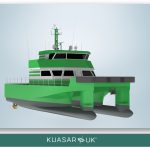A study to investigate using LOHC on offshore service vessels was completed by Newcastle Marine Services, with insight findings to the maritime sector.
Directly addressing two technical challenges of the cost associated with capability building and emission reductions for offshore wind farm maintenance and operation, this project considers the modification of an existing vessel with an innovative, hydrogen-based propulsion/power system. Hydrogen has long been considered as one of the main solutions for emission free transport and is gaining significant attention in combination with energy storage considerations in times of peak production from renewable energy sources such as offshore wind.
The project aims to determine the feasibility of installing a hydrogen-based propulsion and power system on the vessel Søløven and develop a numerical tool that allows modelling of the vessels operation. This system utilises liquid organic hydrogen compounds (LOHC) as an energy carrier in combination with a fuel cell to power the vessels system and propulsion needs.

The operational profile of the vessel was investigated to best fit the capacity of the system design to real-world requirements, and power demands across the vessel during all phases of its mission, for a wide range of consumers, were estimated. An initial analysis of fitting the system onboard the vessel with regards to the impact on stability and seaworthiness of the vessel was also made, including identifying potential areas for expansion of tanks and/or fitting of equipment.
In addition, a numerical tool was developed to analyse the ability of the LOHC system to satisfy the defined mission profiles. This considered the sizing of a suitable hydrogen powered fuel cell to meet the power demands, before simulating the operational; profiles as defined to investigate if the vessel had sufficient capacity to operate safely and effectively. Finally, an initial cost analysis was conducted to determine the feasibility of the LOHC system to be retrofitted to the M/V Søløven.

Figure 1 Endurance Plot of MV Søløven Showing Power Profile and LOHC Consumption and Storage
At the end of this project, it was demonstrated that:
- LOHC can be used as a zero-emission fuel on board an existing vessel
- The feasibility of using available spaces of a short sea offshore service vessel to increase tank capacities is provided and all relevant regulatory stability considerations are complied with.
- The vessel can deliver its usual operation in a commercial context post conversion of the fuel system.
- The energy balance between LOHC dehydrogenation and fuel cell cooling shows that process integration can improve the efficiency of the on-board hydrogen extraction process.
- The costs of running a vessel with LOHC are lower than maintaining the current diesel engine-based system.
- CAPEX costs are large, however return of initial investment may be attractive through increased prices charged as premium for zero emission operations.


